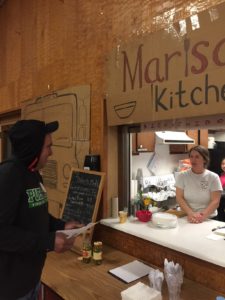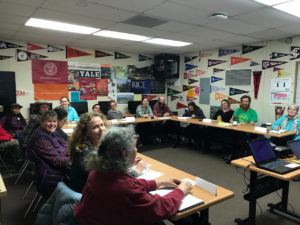
ESL Students practice ordering food at Station Night. Estudiantes de ESL practican ordernar comida en la noche de estaciones.
Most community English as Second Language (ESL) classes don’t test students’ knowledge of spoken English by having them play-act a scenario where Immigration and Customs Enforcement agents show up at their front door and ask to be let in. But Puente isn’t most places.
Station Night, a series of role-playing ‘stations’ created by Puente and staffed by local volunteers, tests students’ ESL proficiency at the end of the semester with English language scenarios. Depending on their level of proficiency, students enact scenes that reflect actual, day-to-day scenarios in their lives.
The ICE home visit station was a brand-new scenario Puente staff added to Station Night in December, while many ESL students are Green Card holders or citizens, this activity reflects the realities many have living without documents in today’s political climate.
“This is just a scenario for which we wanted students to be prepared as much as possible,” says Lizeth Hernandez, Puente’s Education Director. “We also provided students with red cards [to communicate with agents] so if they didn’t want to speak, they didn’t have to – they could just slip them under the simulated ‘door.’ But some students were more vocal and they said, ‘If you don’t have a warrant, I won’t open the door.’”
Students went home with important knowledge about a potential encounter with ICE. They also practiced their English at stations where they simulated scenarios like how to handle the aftermath of a car accident (like exchange information and file a police report), and what to do if they get a scam call – and how to tell that it is a scam.
Puente’s message is that communication is not just a minor aspect of polite social behavior. Language itself is a tool that can help students navigate the most important (and frightening) moments in life.
“Many of the ESL students did not have an opportunity to start or finish their education. Their stories are about being in the U.S. and trying to survive. A lot of them come wanting to learn survival English,” says Monica Resendiz, the newest instructor in Puente’s Adult Education program.
Resendiz teaches one beginner ESL and two levels of Spanish. Her ESL students enjoy learning the proper tenses and basic building blocks of the English language, but they also have an urgent need to learn basic conversational sentences. They need to know the days of the week, and how to make an appointment.
The new semester kicked off in mid-January with four ESL classes for adults, at levels ranging from beginner to advanced. Puente also re-launched Spanish classes in Pescadero that drew a record number of students.
Speaking of records, Puente enrolled 36 students in the second semester of its popular Early Childhood Education class that Puente offers in conjunction with Cañada College and La Costa Adult School. Students are coming from as far away as Half Moon Bay for the opportunity to earn a professional certification toward working with young children in a preschool setting.
The class serves a vocational purpose: at the end of the two-year cohort, graduating students will be eligible for a state license to become an assistant teacher at a preschool or parent co-op.
“When we talk about education opening doors, it can be an abstract idea. Whereas this is tangible, and it makes it more enticing. It’s a shorter trajectory with something physical at the end of it that they have earned,” says Hernandez.
Puente’s ESL classes have also evolved to the point where Puente is switching to a year-based system that will allow teachers to build on students’ progress over two consecutive semesters, according to Hernandez. Results from Station Night are used to inform staff about that progress, and students will be re-tested on the same stations at the next Station Night in May.
“For some of them, Spanish isn’t even their first language,” she says. “They’re handed so many papers when they get here, and they don’t read English and they just want the knowledge to break it down.”
Her Spanish students are local community members who want to get to know their neighbors. But Resendiz says her Latino ESL students have a similar goal.
“It’s the same thing. In both classes, they want to understand each other,” she says.
If you would like to volunteer at Station Night in May, please contact Program Director, Lina Mira at lmira@mypuente.org. We are always looking for volunteers to role-play being doctors, shopkeepers, and police officers and practice speaking English with ESL students. No prior experience required, just the desire to continue to support our students and build community.
Puente’s adult education programs rely on the support of our donors. To help underwrite the costs of instructors, childcare, or materials, donate now.

Spanish Class- Clase de Español
Las clases de adultos ayudan a los estudiantes a enfrentar un clima difícil
La mayoría de las clases comunitarias de inglés como segunda lengua no examinan a los estudiantes sobre su conocimiento del inglés haciéndoles que participen en una dramatización donde agentes del Servicio de Aduanas e Inmigración (ICE, por sus siglas en inglés) se presentan en su casa y piden que se les deje entrar. Pero Puente no es un lugar común.
La noche de estaciones, una serie de situaciones dramáticas creadas por Puente y llevadas a cabo por voluntarios locales, pone a prueba el conocimiento y entendimiento del idioma inglés de los estudiantes con situaciones donde los estudiantes practican el inglés. Dependiendo de su nivel de competencia, los estudiantes ponen en escena hechos que reflejan la realidad cotidiana en sus vidas.
La situación de la visita al hogar del ICE es una de las dramatizaciones nuevas que el personal de Puente añadió a la noche de estaciones en diciembre. Aunque muchos estudiantes de inglés como segunda lengua tienen tarjeta de residencia o son ciudadanos, esta actividad refleja la realidad que muchos han estado viviendo al no tener documentos en el clima político de hoy.
“Es tan sólo una situación ficticia para la que nos gustaría que los estudiantes estuvieran preparados en caso que fuera posible”, dice Lizeth Hernández, Directora de Educación de Puente. “También les damos a los estudiantes tarjetas rojas [para comunicarse con los agentes] de modo que, si no quisieran hablar, no tuvieran que hacerlo – simplemente tendrían que deslizar la tarjeta bajo la puerta simulada. Pero algunos estudiantes querían hacerse oír y dijeron “si usted no tiene una orden judicial, no abriré la puerta.”
Los estudiantes se fueron a casa con conocimientos importantes sobre un potencial encuentro con el ICE. También practicaron su inglés en escenas simuladas como qué hacer si ocurre un accidente de tráfico (como intercambiar información o solicitar un informe de la policía), y qué hacer si reciben una llamada fraudulenta – y cómo distinguir cuando es un fraude.
El mensaje de Puente es: la comunicación no es tan sólo una cortesía. La lengua en sí misma es una herramienta que pueda ayudar a los estudiantes a navegar los momentos más importantes (y preocupantes) en la vida.
“Muchos de los estudiantes de inglés como segunda lengua no tuvieron la oportunidad de comenzar o acabar sus estudios. Sus historias son acerca de estar en los Estados Unidos y tratar de sobrevivir. Muchos de ellos vienen queriendo aprender inglés para sobrevivir y navegar”, dice Mónica Reséndiz, la instructora recientemente incorporada al programa de educación de adultos de Puente.
El nuevo semestre comenzó a mediados de enero con cuatro clases de inglés como segunda lengua para adultos, en niveles desde principiante hasta avanzado. Puente también dio comienzo una nueva edición de las clases de español en Pescadero, lo cual atrajo a un número récord de estudiantes.
Hablando de récords, Puente registró a 36 estudiantes en el segundo semestre de su popular Clase de Educación de la Infancia que Puente ofrece con la colaboración de Cañada College y la Escuela de Adultos La Costa.
La clase sirve un propósito profesional: al final del programa de dos años, los estudiantes que se gradúan podrán obtener una licencia estatal para convertirse en asistentes de maestros en un preescolar o cooperativa de padres y madres.
“Decir que la educación te abre las puertas puede ser una idea abstracta. Sin embargo, esto es una posibilidad, y lo hace más atractivo. Es una trayectoria más corta con algo físico al final que se puede conseguir”, dice Hernández.
Las clases de inglés como segunda lengua de Puente han evolucionado hasta el punto en que Puente va a cambiar a un sistema de años académicos que permitirá a los maestros y maestras partir del progreso de los estudiantes durante dos semestres consecutivos, según Hernández. Los resultados de la Noche de Estaciones se utilizarán para dar información al personal sobre el progreso, y los estudiantes pasarán por un nuevo examen en las mismas situaciones en la siguiente Noche de Estación en mayo.
Reséndiz enseña una clase de principiantes de inglés como segunda lengua y dos niveles de español. Sus estudiantes de inglés disfrutan aprendiendo los tiempos verbales adecuados y las piezas básicas de la lengua inglesa, pero también tienen la necesidad urgente de aprender frases básicas. Necesitan saber los días de la semana, y cómo hacer una cita.
“Para algunos de ellos, el español no es su primera lengua”, dice. “Se les dan tantos papeles cuando llegan aquí, y no pueden leer inglés y simplemente quieren el conocimiento para poder entender las cosas por partes”.
Sus alumnos de español son miembros de la comunidad local que quieren conocer a sus vecinos y poder platicar. Reséndiz dice que sus estudiantes latinos de inglés tienen una meta similar. “Es la misma historia. En ambas clases, quieren entenderse mutuamente”, dice.
Si desea involucrarse y ser un voluntario en mayo para la noche de estación por favor comuníquese con Lina Mira, Directora de Programas al lmira@mypuente.org. Siempre estamos buscando voluntarios que jueguen el papel de un doctor, comerciante, o policía y practicar hablando ingles con nuestros estudiantes. No se requiere experiencia previa solo el deseo de apoyar y convivir.
Los programas de educación de adultos en Puente dependen del apoyo de nuestros donadores. Para ayudar con los gastos del programa como maestros, cuidado infantil, o materiales, contribuya hoy.


